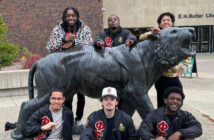As Halloween approaches, Lehigh’s new event policy is more relevant than ever in ensuring that Greek organizations do not host social events promoting inappropriate or offensive themes.
Last spring, Lehigh enacted a chapter events policy within the Greek community to enforce the respect, support and dignity of every student, faculty, staff and community member on campus.
The policy states, “The Fraternity and Sorority Community commits to supporting the spirit and intent of these initiatives by prohibiting all events that, through the actions of organizations or individual members, negatively affect the dignity of any student or inhibit the promotion of mutual understanding among Lehigh community members.”
The policy, which directly confronts and rejects any discriminatory act, protects the rights of students of any race, ethnicity, gender, sexual orientation, economic status, political affiliation and more. With the support of Lehigh University’s Interfraternity Council and Panhellenic Council, the policy has been maintained and supported since its passing.
“Not all themed parties are problematic,” said Chris Mulvihill, assistant dean of student conduct. “This policy is about themed parties that are harassing, demeaning, cause a hostile environment or otherwise violate the Principles of our Equitable Community.”
Pennsylvania State University’s chapter of Chi Omega sorority was forced to shut down after a photo of members dressed in stereotypical Mexican clothing for a Halloween party in 2012 surfaced. Similarly, chapters at Lehigh have faced trouble for hosting offensive themed parties.
Themed parties of this nature promote the idea that the organizations that host these events don’t care about those they are offending, and it causes a lack of respect among the organizations who host these parties and those who are offended by them.
“If you have to question whether or not your costume is appropriate, it probably isn’t,” said Nick Kleinert, ’15, judicial affairs chair of the Interfraternity Council. “Any movement towards acceptance and inclusion is a positive change in our community. It makes (the) IFC and our fraternities think a little bit harder about how they represent themselves on campus and in daily life.”
Mulvihill also explained that the chapter events policy was developed and adopted largely by student organizations, including Lehigh’s three governing Greek councils and the Council of Student Presidents.
“As student leaders, they are aware that they are a part of promoting a positive campus climate,” Mulvihill said. “I believe that Lehigh University’s students are good people that have the best interests of their fellow students at heart. This policy helps students frame their actions in a manner that is consistent with our community’s expectations.”
The policy as a whole strives to present Lehigh as a safe and accepting environment for all people. Brenna Healy, ’15, Panhellenic vice president of judicial affairs, said the decision to wear an inappropriate Halloween costume or “degrading theme” reflects negatively on both her sorority and the Greek community as a whole.
“Hopefully, by looking at the bigger picture, members of the Greek community will think twice about their costumes and themed parties in the future,” Healy said.
Overall, both the Panhellenic Council and Interfraternity Council have made strides within the Greek community to eliminate discriminatory, degrading and offensive costumes from this year’s Halloween lineup. To set an example for their community this Halloween, Kleinert said he plans on being a sexy cat, and Healy and her roommates are hoping to pull off the cast of Spongebob Squarepants.





Comment policy
Comments posted to The Brown and White website are reviewed by a moderator before being approved. Incendiary speech or harassing language, including comments targeted at individuals, may be deemed unacceptable and not published. Spam and other soliciting will also be declined.
The Brown and White also reserves the right to not publish entirely anonymous comments.